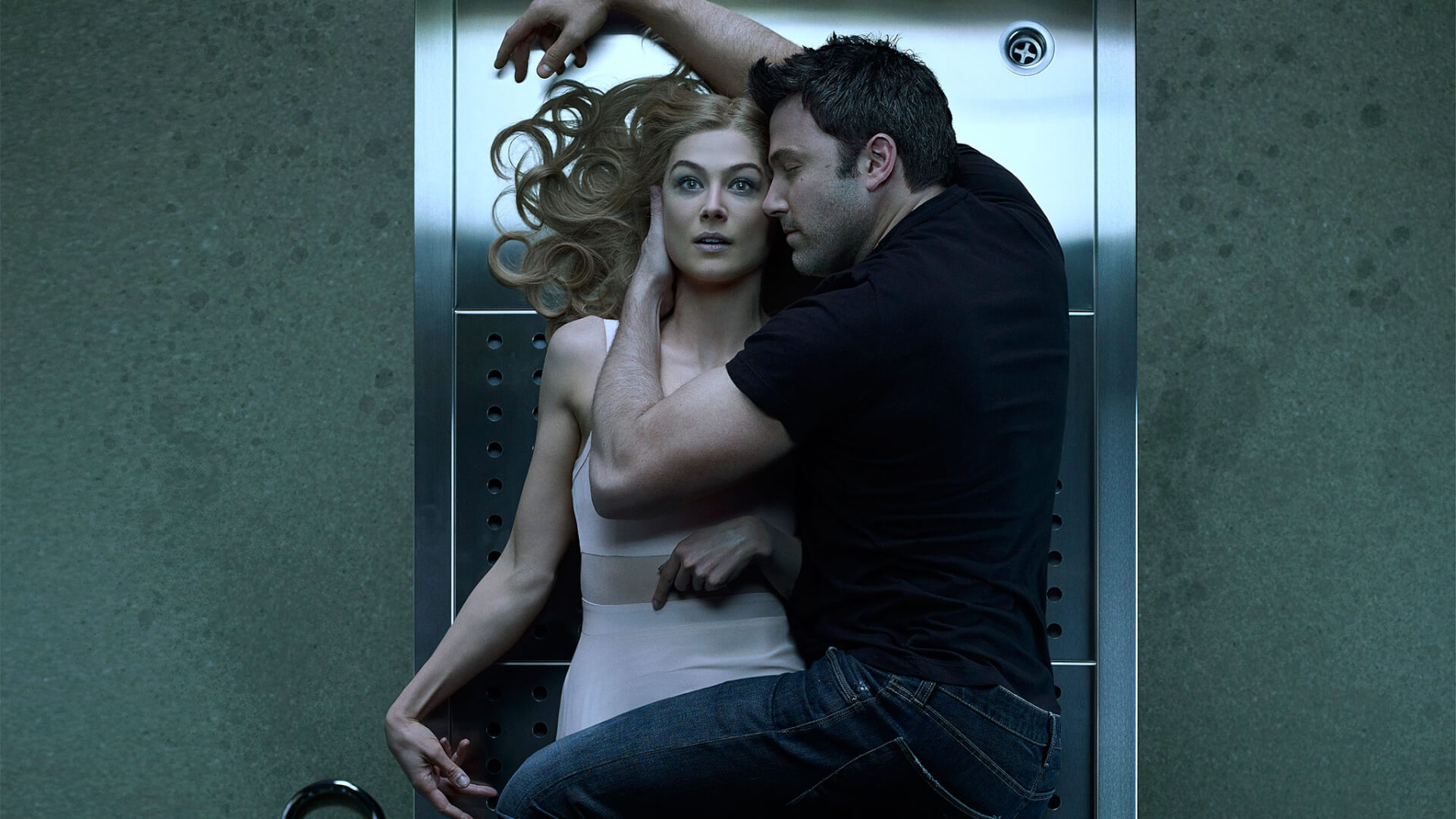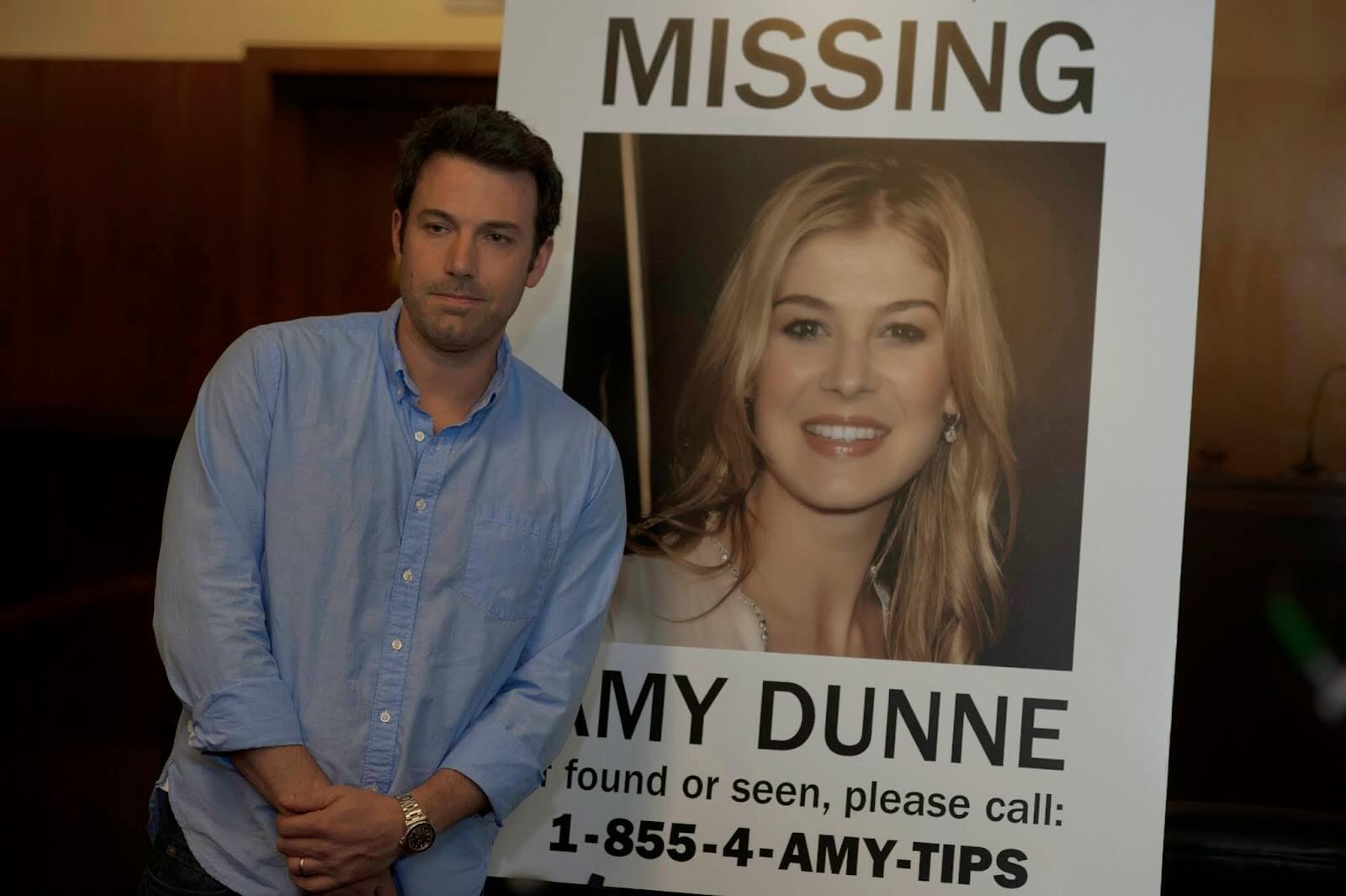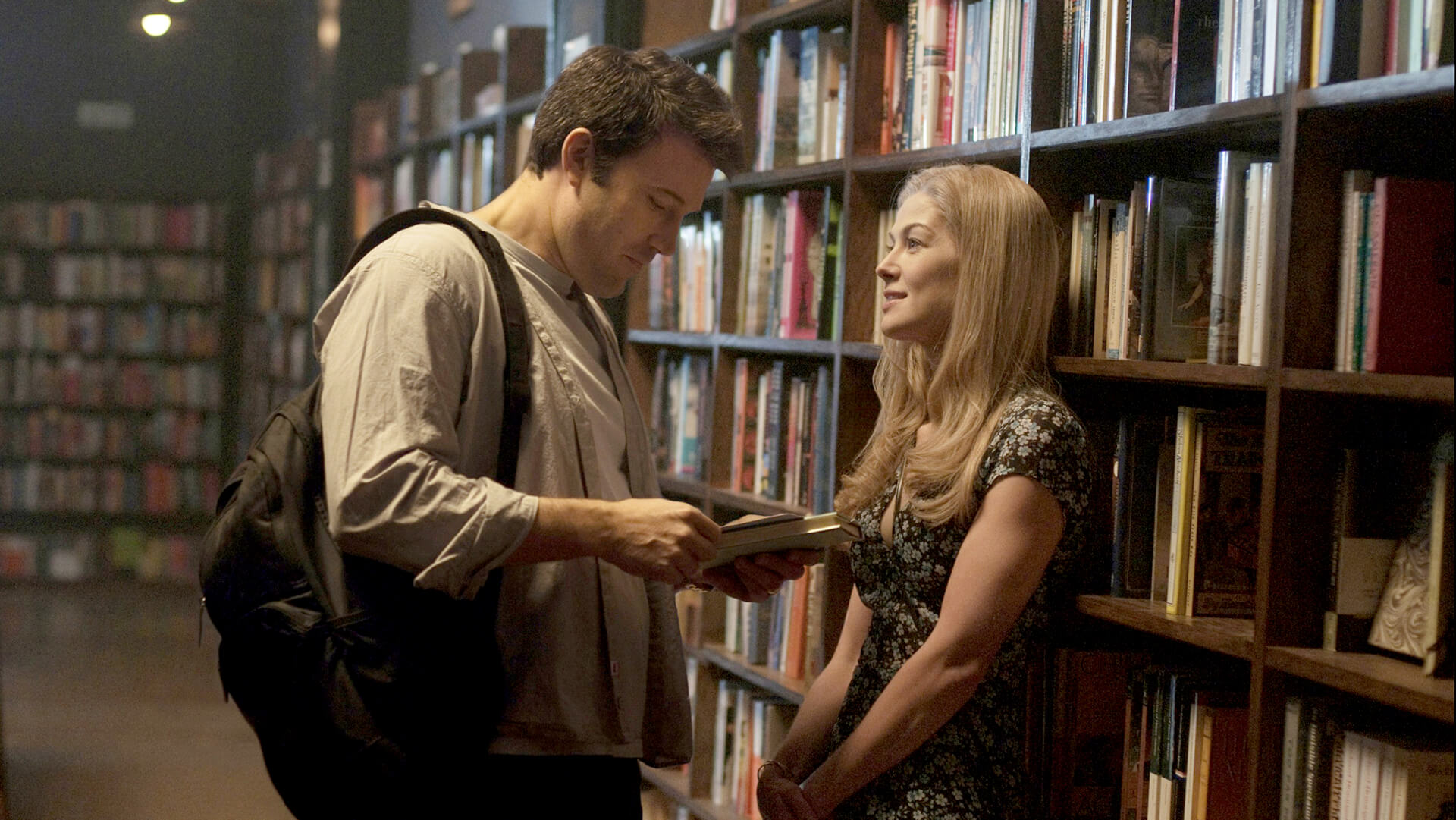GONE GIRL. Great (and gloomy) thriller from David Fincher

…and ending with the The Girl with the Dragon Tattoo. His heroines are strong, intelligent, and warrior-like but, at the same time, they are abused, beaten, raped, and in some cases, killed. In Se7en, one of them loses her head, in The Curious Case of Benjamin Button, a character played by Cate Blanchett is forced to watch her beloved age backward as she ages, and Fight Club is a club exclusively for men. The fairer sex doesn’t have it easy in Fincher’s world.
Therefore, the starting point of his new film, where the wife of the main character is initially considered missing and soon presumed murdered, is not surprising. Misogyny, whether in the foreground or background, seems somehow ingrained in the DNA of Fincher’s films, even if the woman ultimately triumphs over the man. But Gone Girl is a special case – it reverses roles, not once, not twice, but continuously. Nick Dunn may or may not have killed his wife, but for many, he becomes the biggest victim of the entire situation.

On the fifth anniversary of Nick and Amy’s marriage, Nick discovers disturbing signs suggesting that something bad has happened to his spouse. A shattered table, bloodstains in the kitchen, and, most importantly, the absence of Amy quickly prompt the police to launch extensive searches, involving not only the closest family but also the entire community of a small town in Missouri. Nick’s behavior, both secretive and clearly hiding something on one hand, and overly smiling and animated on the other, raises concerns. The fact that he cannot provide any answers to questions about his wife – what she does when alone at home or with whom she befriends – adds to the suspicion. Subsequent events paint him in an increasingly negative light, suggesting that he may have more to do with Amy’s disappearance than initially thought.

The search thread intertwines with numerous flashbacks showing the relationship of the main characters from Amy’s perspective. Amy’s diary entries clearly implicate her husband but also explain how their perfect marriage reached a critical point. Recession, job loss, moving from New York, illness, and the death of Nick’s mother – in a short period, the magic and passion in their relationship vanish. However, Fincher and screenwriter Gillian Flynn, whose book served as the basis for Gone Girl, use Amy’s notes not only as a background for her disappearance but also to provide a kind of correspondence duel between husband and wife, whose versions of events do not always align. Speaking ill of the missing wife is not suitable for Nick, while Amy’s written words have no such limitations, directly pointing the finger at the guilty party.

Like in the case of Klaus von Bülow, public opinion is more appalled by Nick’s behavior, unsuitable for the situation, than the truth about his wife’s disappearance. Is he really so incorrect as to be stigmatized? The media call him a “killer,” neighbors and Amy’s parents turn away from him, and the police increasingly solidify their belief that he is guilty. Interestingly, it seems not coincidental that women are behind the entire public persecution, solidly organized against male violence. However, their image disqualifies them from the start. The television presenter attacking Nick uses embarrassing arguments, Amy’s mother appears from the beginning as a controlling person, and the neighbor, supposedly Amy’s best friend, is intrusive and not very credible. Even though a woman leads the investigation, she remains remarkably impartial not only because of her position. Fincher’s serious and cold thriller gains colors because the director is no longer interested in the mystery. Cynicism hiding behind our attraction to tragedy, especially media tragedies, comes to the surface, and the characters try to achieve their goal through various forms of manipulation.

Fincher himself deceives in Gone Girl. The film is full of surprises, especially in terms of the plot, but what impressed me the most is how easily the creator of The Game plays with the genre of his work. The thriller not only turns into a satire on media and its influence but also into the darkest of black comedies. From a certain point, tragedies and new revelations cause less anxiety and more healthy laughter, suggesting ambitions beyond a standard thriller. The film’s tone remains exceptionally somber, typically Fincheresque, but this does not bother the director, especially Flynn, in creating situations that complement the image of marital madness and nightmare.

From a certain point, the screen is dominated by absurdities and the logic of a sick mind. Please do not consider this as a criticism. Absurdity does not overshadow the narrative but the characters, making them more powerless and devoid of support in the real world. This is served by the dual (a better word might be “split”) narrative but also the actors, restrained, as if not allowing approval for all this madness. Ben Affleck as Nick tries to be as normal as possible, but beneath this facade lies eternal turmoil. He is excellent, especially in scenes with his on-screen sister, brilliantly played by Carrie Coon, his kindred spirit and confessor. We also believe in his relationship with Amy, although Rosamund Pike in this role has a much more difficult task. Her absence allows interpreting everything we learn about the titular character in many ways. She is an enigma, a great unknown, simultaneously a typical woman from Fincher’s films trying to free herself from the influence and domination of men. Other characters are only supporting roles, often excellent (especially Kim Dickens as a probing lady detective and Tyler Perry playing Nick’s witty lawyer), but less significant in the drama that the director serves in the finale.

Is Gone Girl a successful film? Without a doubt, although I would refrain from calling it the best in Fincher’s career. But is it also a wise work, speaking the truth about the difficulties and pitfalls of marriage? It is certainly cleverly shot and written cinema, giving food for thought as a warning against sacrificing oneself to another person, unconditional submission, rejecting one’s own aspirations and dreams for the sake of shared life. However, Flynn’s invented story works better as gloomy entertainment than a deep analysis of a toxic relationship. Extremes are presented here in a subtle and elegant way but still remain extremes. Blood looks beautiful on white sheets and on a woman’s body, but does that mean it shouldn’t evoke disgust, unease, or even fear in the viewer? Fincher’s style too smoothly smoothens everything; he levels drama, humor, and horror, not allowing one to prevail over the rest.
Fortunately, the ending of Gone Girl is strong and final, impossible to reduce to the level of a cruel joke. The destruction we observe during the entire investigation is nothing compared to the calmness of the final scenes. The director cuts Gone Girl at a moment that for many would be ideal as the beginning of the end, a prelude to a grand finale. But after spending two and ahalf hours with Nick and Amy, it’s a good idea to let them rest. Flynn and Fincher know well that certain problems must be solved behind closed doors.

